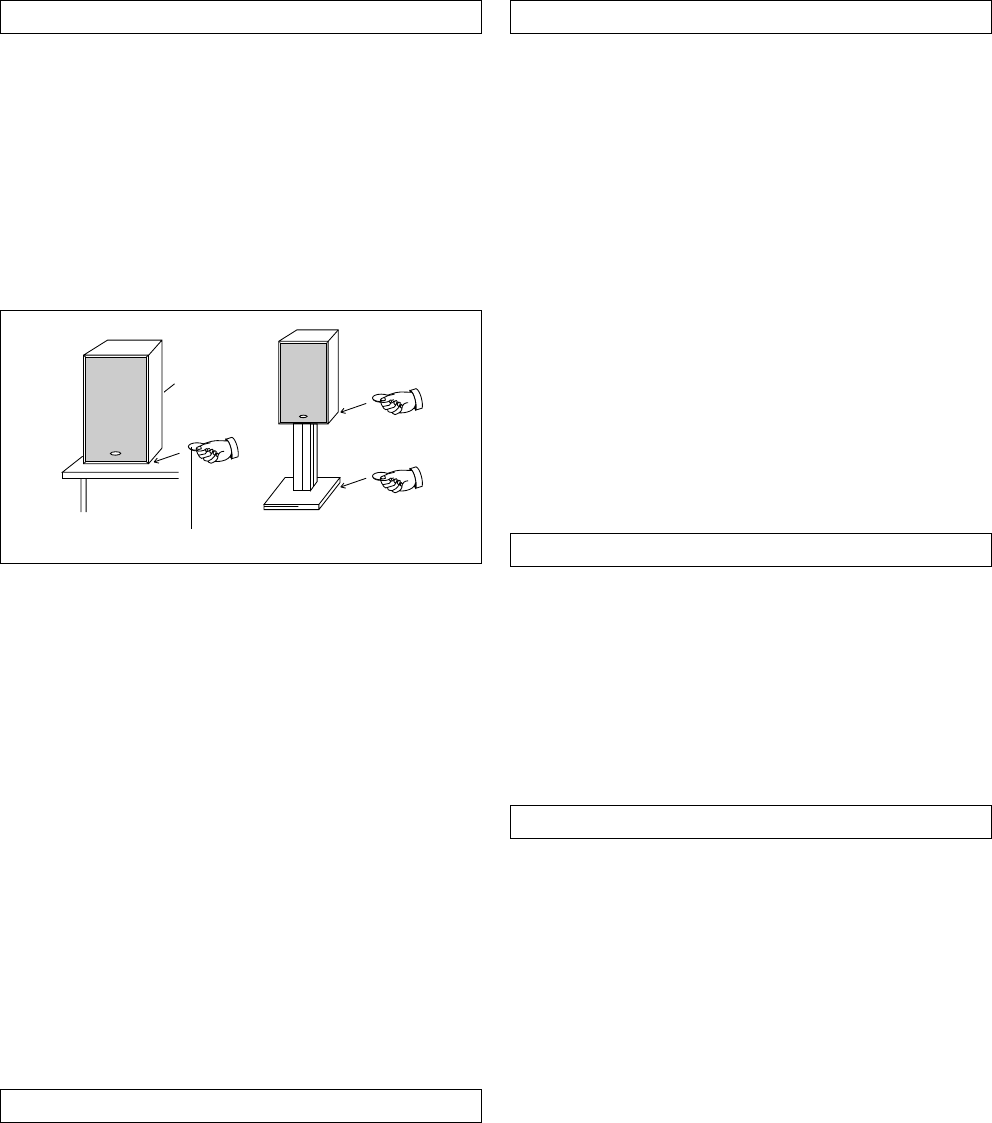
3
Speaker care
Wipe the cabinet occasionally with a dry silica or soft cloth. For
heavier dirt, after dampening a soft cloth in a weak solution of
mild detergent and water and wringing it out dry, wipe off the
dirt. Then, dry immediately with a clean cloth. Do not use
rough material, thinners, alcohol or other chemical solvents or
cloths since these could damage the finish or cause discolora-
tion. If you are using a chemical cloth, always follow the
instructions that come with the cloth. For dust accumulated on
grilles, use a vacuum cleaner or brush it off.
Use with a TV set or computer
In general, Braun tubes used for color television sets and
computers are extremely sensitive and can be affected even
by the magnetism of the earth. If a speaker system is used
near them, therefore, discoloration or distortion of pictures will
occur. To allow use with a color television set or computer, this
speaker system is provided with magnetic shielding. Even so,
discoloration may still result, depending on the installation
environment. If discoloration occurs, turn off the power of the
television set or computer, wait for 15 to 30 minutes and then
turn it on again. This activates the self-demagnetizing func-
tion of the television set or computer, improving the display
condition. If discoloration persists even after performing this
remedy, move the speaker apart from the television set or
computer. Discoloration may also be caused when a magnet
or other magnetizing object exists near the television or
computer because of the combined effect.
Precaution on use
• This speaker system can handle the specified input power
when it is used for ordinary music reproduction. If the
following abnormal signals are fed to the speaker, how-
ever, an overcurrent may flow in the internal circuits,
causing burning or breakage of the wires even if the input
power is below the specified rating.
1. Noise produced when FM station is not tuned in
2. Sound produced when fast-forwarding cassette tape
deck
3. High-frequency sound generated by an oscillator, an
electronic musical instruments, etc.
4. Oscillating amplifier signals
5. Special test signals produced by audio checking CD, etc.
6. Sound produced when connecting or disconnecting au-
dio connection cables (Always turn off the amplifier’s
power before connecting or disconnecting cables.)
7. Howling when a microphone is used
• Do not place magnetic objects such as screwdrivers and
iron parts near the tweeter since they use speakers with
strong magnets. Otherwise, the objects may be attracted,
causing injury or damaging the diaphragm.
Thin discs of metal, such as coins
✽ Specifications and appearance may subject to change for improvement
without prior notice.
Specifications
Type: 2-way bass reflex
Impedance: 5 Ω
Maximum input power: 70 W
Output sound pressure level
: 84 dB/W/m
Frequency response: 60 Hz- 35 kHz
Crossover frequency: 10 kHz
Cabinet capacity: 3.8 L
Speaker: Woofer: 12-cm cone
Tweeter: 2.5-cm dome
Dimensions: 130 (W) × 220 (H) × 216 (D) mm
(5-1/8
"
x 8-11/16
"
× 8-1/2
")
Weight: 2.9 kg (6.4 lbs)
Accessories: Instruction manual (this manual)
1.8-m speaker cable × 2
Others:
Magnetic shielding
Placement
The sound quality a speaker system reproduces varies greatly
depending on the construction and area of the room where it
is installed, as well as the location and size of the furniture. For
better-quality sound, observe the following precautions.
• Placing the speaker system directly onto the floor surface
results in undesirable boom, that is, sound with extremely
heavy bass. Place each speaker on a speaker stand,
concrete blocks, bricks or rigid bookshelf.
• High-quality bass sound cannot be obtained if the speak-
ers are not seated stably on a speaker stand or other base.
Insert thin discs of cork or metal (such as coins) to seat the
speakers stably.
• If speakers are placed on a bookshelf etc., where a large
area of the speaker surface makes contact with the
supporting surface, reducing the contact area between
the speakers and the bookshelf by inserting cork discs or
coins generally improves the sound quality.
• To obtain a deeper bass sound, mount the speakers on
lower speaker stands and place them in front of a wall with
sufficient rigidity.
• In many rooms, the furniture and wall affect the repro-
duced sound quality. For stereo sound reproduction, plac-
ing the Right and Left speakers in the same condition
produces the best results. If they are placed in extremely
different conditions, the Right- and Left-channel balance
will be adversely affected.
• The ideal placement of the speaker system is as follows:
Imagine an equilateral triangle and position the Right and Left
speakers on both ends of the base. The ideal listening
position is at or slightly to the rear of the triangle apex.
• Glazed doors or surrounding walls in front of the speaker
system may cause the resonance of specific frequency
ranges due to reflected sound. To eliminate this reso-
nance, place some sound-absorbing material such as a
thick curtain in front of the doors or walls.






